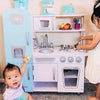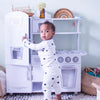Problem Solving Activities for Toddlers

7 Problem Solving Activities for Toddlers
If you have a toddler, challenges like tough homework problems or social dilemmas are still a long way off. But their brains are already working to build the cognitive skills they’ll need to solve life’s “big” problems later on. For now, problem-solving activities – even ones that seem simple to us – can help them boost their cognition, resilience, and creativity. Best of all? These “problems” are actually fun! Here are seven simple problem-solving activities for toddlers and preschoolers you can start trying right away!
Memory Games
Those little memory card games with matching pictures are great for building concentration, memory, and problem-solving skills in your toddler! Many sets might come with a few too many pairs for a toddler to handle without help, so start with just three to four pairs and see if they can match them up! As they begin to master that, you can add in more and more pairs until they’re working with the entire deck. If you don’t have a deck, you can easily DIY your own with online printables or your own drawings.
Shape Sorters
Shape sorters are a classic problem-solving toy for young toddlers. In addition to matching the shapes to the correct holes, they’ll also need to figure out why the shapes don’t always fit into the hole, requiring them to rotate the shape or make subtle adjustments to their grip.
Sorting/ Grouping by Category
Sorting activities are excellent for toddlers’ problem solving and cognitive development, so there’s no need to stop with shape sorters! Set up simple activities that allow them to sort by a variety of categories. This can be as simple as letting them unload the dishwasher silverware tray into the silverware organizer. Or ask them to gather up all the yellow items they see in a room.
Puzzles
Rotating puzzles is a great way to keep the problem-solving challenge fresh for your toddler. Even a familiar puzzle can present a fun, “new” challenge for your toddler if they haven’t seen it in weeks.
Hide the Teddy Bear
One cognitive milestone for two-year-olds is the ability to find an object that’s been hidden under two or more layers. Once they’ve mastered that, they’ll be ready for more advanced hiding games. Try hiding a teddy bear or other toy when they aren’t looking and then give them clues to find it. You can start off with basic directions and then progress to tougher clues or games of warmer/ colder.
Help Mommy/ Daddy
Toddlers love to help, and helping Mommy or Daddy with a problem can be a lot less frustrating than solving their own. For example, if your little one has been determined to put on their own socks lately but always ends up super frustrated, try mimicking the same problem yourself and asking for their help. You can coach them through the process (“Now we need to stretch out the opening of the sock!”), and because their emotions aren’t already running high, they’ll be more likely to actually absorb your tips. You can model how to stay calm through frustrating situations and help them build confidence in their ability to tackle the same problem later.
Constructive Play Toys
The ability to build a block tower of four or more blocks is actually considered a cognitive milestone for two-year-olds. For three-year-olds, a tower of six or more blocks is the expected milestone. That’s because building anything, even a simple block tower, is a true problem-solving challenge for toddlers. Blocks, train sets, and other building toys let your child work out how to balance, fit pieces together, and deal with frustration as they learn to master the challenge.





